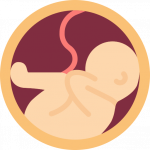
Doctors confirm that the risks are minimal for pregnant women who have a healthy and normal pregnancy. Women who have a complicated pregnancy should travel with greater caution.
The best period for an airplane flight is mid-pregnancy. From week 14 to week 28, there are the lowest risks for a baby and pregnant women feel best. Abortion is increased in the first trimester, so flying is not recommended. The risk of premature birth is increased in the last third, so this period should also be avoided. Also, airplane comfort is reduced due to the large stomach.
If the journey is between the 28th and the 32nd week, the pregnant woman must have a gynecologist’s confirmation of the age of the pregnancy and the expected delivery period. The medical certificate should include information on age, last menstruation, date of birth and number of previous pregnancies. At the airport, they may be looking for the latest results from laboratory tests and ultrasounds, as well as if there are any potential birth defects.
Pregnant women who are still two weeks away from childbirth will not be admitted to flight. Also, they are not allowed flights with stops where the break is longer than 4 hours. During longer flights, it is advised to get up and take a walk to avoid blood clots.

Women who carry one child by the 32nd week of pregnancy are free to fly by plane. If twin pregnancy is concerned, this limit is reduced by two months. Please note when purchasing an airline that the return flight is before the 36th week, as the airline will not allow a pregnant woman to board the plane no matter where it is.
If the passenger is in advanced pregnancy (four weeks before the birth date), the airlines require a MEDIF form. For women who carry twins, this document is required if there are still six weeks left to give birth.
Women who have high blood pressure, diabetes, anemia, and other similar problems during pregnancy should not fly an airplane.
Also, it is not advisable to fly if a woman has problems with blood clotting or has been diagnosed with placental insufficiency. Also, all pregnant women should avoid smaller aircraft, due to higher turbulence.
Airlines do not accept babies who are just born on the flight. The lower age limit is seven days, though for some companies it maybe 14 days after birth.